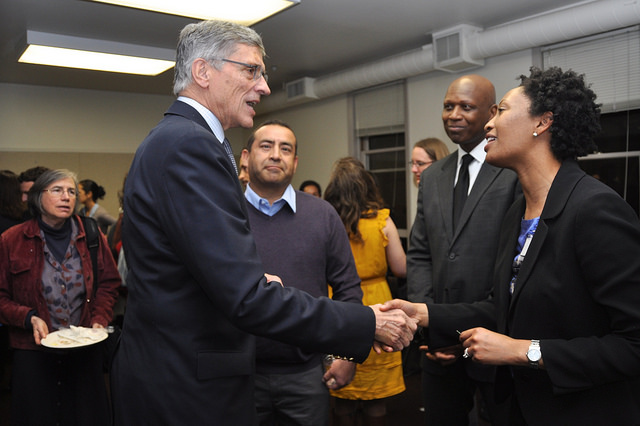
Good afternoon.
Let me start by thanking everyone who is the room today. I also know there are hundreds of community leaders watching online from Voices for Internet Freedom, including the Media Action Grassroots Network, Presente.Org, ColorofChange, 18MRising, National Hispanic Media Coalition and Free Press. Thank you for your hard work on the ground, leading the fight, and reminding everyone that this conversation is both inadequate and incomplete if it doesn’t leave the Beltway.
I want to extend a special thank you to the FCC Chairman, Commissioners, and staff who made this event possible, thank you for the invitation.
My name is amalia deloney and I serve as Policy Advocate, representing the Media Action Grassroots Network, a national network of 175 organizations working to advance media access, rights and power for the 99%.
Yesterday, kicked off Latino heritage month, so it seems especially appropriate to open my remarks with a quote from Cesar Chavez, who once said, “The fight is never about grapes and lettuce, it is always about people.” First shared during the UFW grape boycott, the quote reminds us there are always real people and real lives at stake, and we have a responsibility to ensure the most vulnerable are protected. Just as the grape boycott wasn’t only about produce, the fight for an Open Internet is not only about technology- it’s about the thousands of individuals whose quality of life, depends on a real Open Internet, whether wired or wireless.
From job applications and healthcare, to federal benefits and online education, the regulation of our immigration status, and entrepreneurship we rely on the Internet. With low barriers to entry we have the potential to access infrastructure that can support our work as artists and musicians- like the hundreds of members of Alternate ROOTS who span the South. A region hardest hit by poverty, and with a powerful history of local self-reliance. An Internet free from discrimination allows for truth-telling about police murders in communities like Ferguson., Staten Island, Oakland and Sanford— by organizations like #blacklivesmatter, Million Hoodies & ColorofChange. And an Internet without paid prioritization means new Civil Rights leaders like Presente.org can fight hate speech with online advocacy- removing pundits who target migrant communities. And 18MR can harness the power of technology and social media to organize when Jeremy Lin is called racist names during an NBA game.
Together these organizations and more, filed comments to the FCC on behalf of thousands of members, calling on the Commission to adopt rules to protect our wireless experience.
Given that our communities- the rural and urban poor, immigrant, Tribal and communities of color- disproportionately rely on mobile broadband as our primary means of Internet access, and because many digital divide initiatives name mobile broadband technology as a part of their solution- the Commission must apply Open Internet rules equally to fixed and mobile Broadband. Further, the Commission must ground these protections with their Tittle II authority by reclassifying Broadband as a telecommunications service.
I started my comments referencing the 99% that MAG-Net represents- and I’ll close by acknowledging them too. The are the 47% of Latinos and 38% of Blacks who are cell phone only households. The 25% of Smartphone users who ‘mostly’ go online from their handheld device; the 14.5 million rural households that lack broadband access, and the 25% who say home broadband is too expensive. These people make up the 99% we represent- and they need the same strong Open Internet protections on their wired and wireless devices.
There is nothing extreme about this- this is what democracy looks like.



